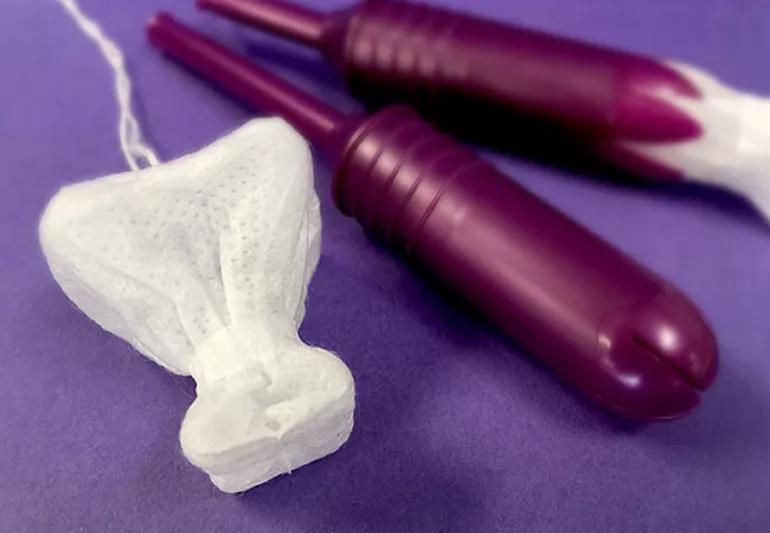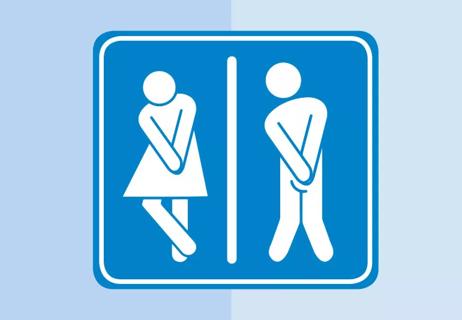Exploring an available OTC option

Stress urinary incontinence affects millions of women, fueling anxiety in all kinds of day-to-day situations — even a sneeze, a laugh or a workout at the gym can prompt unexpected leakage. However, over-the-counter bladder supports now available are helping many women take control of this embarrassing problem.
Advertisement
Cleveland Clinic is a non-profit academic medical center. Advertising on our site helps support our mission. We do not endorse non-Cleveland Clinic products or services. Policy
The short answer is that they work sort of like tampons, but with some important differences. They come with a tampon-style applicator. But, rather than a wad of absorbent fibers, they are collapsible silicone structures with a non-absorbent polypropylene covering.
Beneath the cover, they look a little like an oversized jack (the classic children’s toy — jacks and ball — not the tool for changing a tire).
Once inserted into the vagina, the support expands to lift and support the urethra (the small tube that conveys urine out of the bladder), helping to stop leaks from stresses such as coughing, sneezing or exercising.
“Stress urinary incontinence is the result of poor tissue support around the urethra,” says Ob/Gyn Cecile Ferrando, MD.
Bladder supports function by providing support to the bladder neck of the urethra or the urethra itself. So when a woman increases the amount of pressure exerted on her bladder during things like exercise, that pressure doesn’t cause the bladder to empty, because the support is there to keep the urethra closed.
Also, while wearing these supports, you still can urinate or have a bowel movement. The supports provide added support to help prevent accidental leaks — but they won’t stop you from urinating and it should not move or fall out during bowel movements.
Bladder supports are often a good alternative to surgery. They’re relatively comfortable and non-invasive, and you can wear them only when you need them.
“A number of more active patients may use bladder supports because they just need something that will help when they’re being more physically active,” says urologist Sandip Vasavada, MD.
Advertisement
Dr. Ferrando says they’re also a good option for women who simply want to avoid the possible risks or complications of surgery. “So they’re not looking for surgery, they just want to manage it when they’re active,” she says.
Like any item worn in the vagina, bladder supports come with a small but important risk of toxic shock syndrome (a rare condition caused by certain strains of bacteria that produce toxins).
They can typically be worn safely for up to eight hours within a 24-hour period.
“As with any other tampon or device you’d insert into the vagina, you’d want to make sure that it’s removed as directed,” says Dr. Vasavada.
Although bladder supports work well on their own, they can also be a part of a more comprehensive treatment plan.
“They can certainly be used with pelvic floor physical therapy to strengthen the pelvic floor muscles and supports around the urethra,” says Dr. Ferrando. The supports must be removed during the therapy, but the two can work together, she says.
Dr. Vasavada says making lifestyle changes (such as reducing your caffeine intake) and taking medication for overactive bladder are also helpful in some cases.
Experts agree that bladder supports are worth a try for nearly any woman struggling with stress urinary incontinence.
However, although the supports offer advantages, they’re not perfect. In a few cases, they are not a good option, including for women who:
Women need to have realistic expectations, Dr. Ferrando says. “There are some patients whose stress incontinence is so bad that the bladder supports are minimally successful,” she says.
Dr. Vasavada says there also is a cost factor. “These supports must be changed regularly,” he says. “Some of my patients find that using the supports every day becomes very costly.”
If you’re not sure what type of incontinence you have, it’s a good idea to talk to your doctor.
“If they don’t have the type of leakage that would be helped by bladder supports — if they have urge leakage or overflow — those patients won’t benefit,” says Dr. Vasavada. “It might even make their symptoms worse.”
If you’re pretty sure you have urinary stress incontinence, however, it’s OK to try bladder supports.
“If women are experiencing leakage with laughing, coughing, running, sneezing or lifting, and it seems like it’s pretty clear-cut, then trying an over-the-counter bladder support is completely appropriate,” Dr. Ferrando says. “They don’t necessarily need to see their doctor first.”
Advertisement
Video content: This video is available to watch online.
View video online (https://cdnapisec.kaltura.com/p/2207941/sp/220794100/playManifest/entryId/1_sz0wz9ae/flavorId/1_5f3sgelj/format/url/protocol/https/a.mp4)
Stress Incontinence vs. Overactive Bladder: What You Need to Know
Advertisement
Learn more about our editorial process.
Advertisement

Latchkey incontinence is common, but you can find relief with bladder retraining and other treatments

Before you run out and buy this specialty underwear, there are treatment options to try first, like pelvic floor therapy and medication

Exercises and medical treatments can help you regain control of your bladder

Know which drugs can affect bladder control

It’s important to angle it toward your rectum or back, along the natural curve of your vaginal canal

To help manage symptoms, switch to more absorbent period products, make healthy lifestyle changes and explore treatment options

Yes, you can pee with a tampon in; no, they won’t stretch out your vagina or make cramps worse!

Estrogen loss contributes to bone loss, which significantly raises your risk of osteopenia and osteoporosis

Wearing a scarf, adjusting your outdoor activities and following your asthma treatment plan can help limit breathing problems

Your diet in the weeks, days and hours ahead of your race can power you to the finish line

When someone guilt trips you, they’re using emotionally manipulative behavior to try to get you to act a certain way